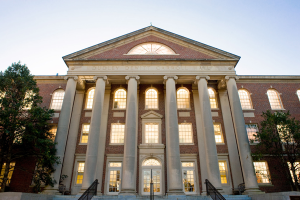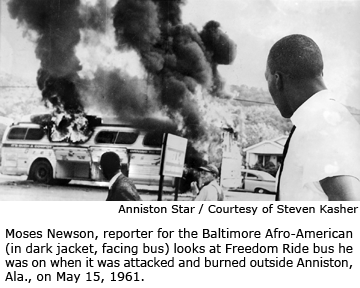Civil rights movement reporters and editors held "Race Beat" panel discussion

 The UNC Hussman School of Journalism and Media hosted a panel discussion Oct. 14 in Carroll Hall with acclaimed reporters and editors who covered the American civil rights movement.
The UNC Hussman School of Journalism and Media hosted a panel discussion Oct. 14 in Carroll Hall with acclaimed reporters and editors who covered the American civil rights movement.
“The Race Beat: History and Legacy” was part of the Nelson Benton Lecture Series at the school.
The event featured the co-authors of the Pulitzer Prize-winning book “The Race Beat,” Hank Klibanoff and Gene Roberts. Klibanoff, former managing editor of the Atlanta Journal-Constitution and former deputy managing editor of The Philadelphia Inquirer, moderated the panel. Roberts, former editor of The Philadelphia Inquirer and former managing editor of The New York Times, was a panelist.
The other panelists were Hodding Carter, UNC professor of public policy and former editor of the Delta Democrat Times (Greenville, Miss.); Joe Cumming, former Atlanta bureau chief for Newsweek; and Moses J. Newson, former executive editor of the Baltimore Afro-American and former reporter at the Tri-State Defender in Memphis, Tenn.
Klibanoff began his reporting career in 1972 in Biloxi-Gulfport, Miss., at The Daily Herald. After reporting for the Delta Democrat Times and The Boston Globe, he moved to The Philadelphia Inquirer in 1982, later becoming deputy managing editor. He was a fellow at the Freedom Forum’s Media Studies Center at Columbia University and taught a course in journalism at the University of Pennsylvania for six years. He joined the Atlanta Journal-Constitution as a managing editor in 2002, stepping down in 2008. In 2007, he won the Pulitzer Prize, along with Roberts, for “The Race Beat.” He recently joined the faculty at Emory University as the James M. Cox Jr. Professor of Journalism.
Roberts grew up in North Carolina, where he was a reporter with the Goldsboro News-Argus and a reporter and editor with The News & Observer. In 1965, he joined The New York Times where he served as chief southern and civil rights correspondent. As a civil rights reporter in the 1960s, Roberts covered uprisings in Detroit, Newark, Cincinnati, the Ybor City district in Tampa, Fla., and Waterloo, Iowa. He also served as chief war correspondent in South Vietnam for The New York Times. In 1972, Roberts became the executive editor of The Philadelphia Inquirer. During his 18 years there, his staff won 17 Pulitzer Prizes. In 1991, he began teaching journalism courses at the University of Maryland and — except for a three-year hiatus to work as managing editor of The New York Times— remained there until his recent retirement. He is a member of the N.C. Journalism Hall of Fame, which is housed in the school.
Carter began as a reporter for the Delta Democrat Times, where he stayed for 18 years, rising to managing editor and associate publisher. He has worked on presidential campaigns for Lyndon B. Johnson and Jimmy Carter. He also was Assistant Secretary of State for Public Affairs and State Department spokesman under President Carter. He went on to become a television commentator, working for ABC, BBC, CNN and PBS. He is a four-time Emmy winner and winner of the Edward R. Murrow Award. He was a Washington opinion columnist for The Wall Street Journal and has been a frequent contributor to The New York Times and The Washington Post. He is a former president and chief executive officer of the Knight Foundation. Since 2006, Carter has been the University Professor of Leadership and Public Policy at UNC.
Cumming started his career in journalism in 1957, joining Newsweek’s Atlanta bureau during the civil rights movement. He was the southern bureau chief for the magazine for 22 years. His work has appeared in Esquire, Southern Voices, Harper’s, Chattahoochee Review, Atlanta Magazine and the Atlanta Journal-Constitution. His book “Bylines” is a collection of freelance articles. Cumming left Newsweek in 1979 and spent the remainder of his career teaching at West Georgia College.
Newson was a reporter and city editor for the Tri-State Defender in Memphis from 1952-57. He went on to the Afro-American Newspaper in Baltimore, where he became executive editor. From 1978-95, he was a public affairs specialist at the U.S. Department of Health and Human Services in Washington, D.C. He co-authored “Fighting for Fairness: The Life Story of Hall of Fame Sportswriter Sam Lacy” in 1998. Newson was inducted into the Hall of Fame of the Maryland-Delaware-District of Columbia Press Association in 2008.